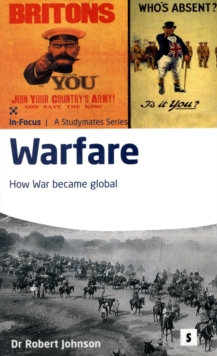War is a persistent, recurrent and tragic part of human history.
Anyone who visits the battlefields of the First World War cannot fail to be struck by the poignancy of the cemeteries there.
Row after row of white headstones, set in immaculate order, stand silent amongst the peaceful hedgerows and fields of France and Flanders.
Walking beside them, one can read the names of individuals where they are known. Often it is the ages, some just 19 years old, which strike home, reminding us that wars are fought by the younger generation, and sadly they are called to make the ultimate sacrifice when their life has barely begun.
As the title suggests, this book is concerned with the changes that took place in warfare, and, as such, a certain emphasis will be placed on 'turning points' in organisation, technology, leadership, or in operations.
The aim of this book is to be an introduction to an enormous subject. Military history is a vast topic, and its study should be set within the context of the history of the period in question, and, in particular the question of its political purpose.
Only by these means can a full appreciation of the military narrative be grasped.
For example, the political upheavals of the French revolution set in motion the revolutionary wars, and these, in turn, assisted the career of Napoleon Bonaparte.
Napoleon was as much a political animal as he was a military leader, and his strategic decision-making reflected his political aspirations to dominate Europe and suppress his rivals.
This book will enable you to get straight to the main features of this subject.
It will also help you to avoid the common pitfalls that have plagued histories of war for years, particularly the assumption that warfare followed a linear trend of development or that it was driven solely by changes in technology. Given that war is a global phenomenon, this book also draws on some examples of warfare outside of the West (Europe and North America), and show influences between different modes of warfare.
These examples also help to illustrate why certain tactics, especially in colonial warfare, survived amongst European forces long after their obsolescence in the west. Compared with earlier epochs of history, the period between 1792 and 1918 was an era of rapid change in warfare.
Weapons, tactics, and training were adapted to suit developments in gunpowder technology, but the professionalism of armies also reflected the modernisation of the European states.
In the eighteenth century, the art of war had reached a sophisticated level.
The co-ordination of infantry, cavalry and artillery on the battlefield and the adequate supply of food, ammunition and equipment had become something of a science. The preparation for war, and the maintenance of an army in the field also required organisation of state finances for pay and administration, recruitment strategies, engineers and technicians to construct cannon and fortifications, and industries to support boot making, saddlery, and the manufacture of munitions, gun carriages and ships.
In analysing warfare, one can identify certain principles, and recognise patterns of war and change.
However, there are many examples where innovation and change brought military disaster.
This reminds us that there are limitations in analyses of military history.
Indeed, military history has itself evolved and developed, incorporating a far greater range of issues now than merely weapons, commanders and orders of battle. That is why this book is so important. Product detailsPaperback: 160 pagesPublisher: StudymatesLanguage: EnglishISBN 9781842850855Product Dimensions: 13.5 x 1.4 x 21.6 cm

